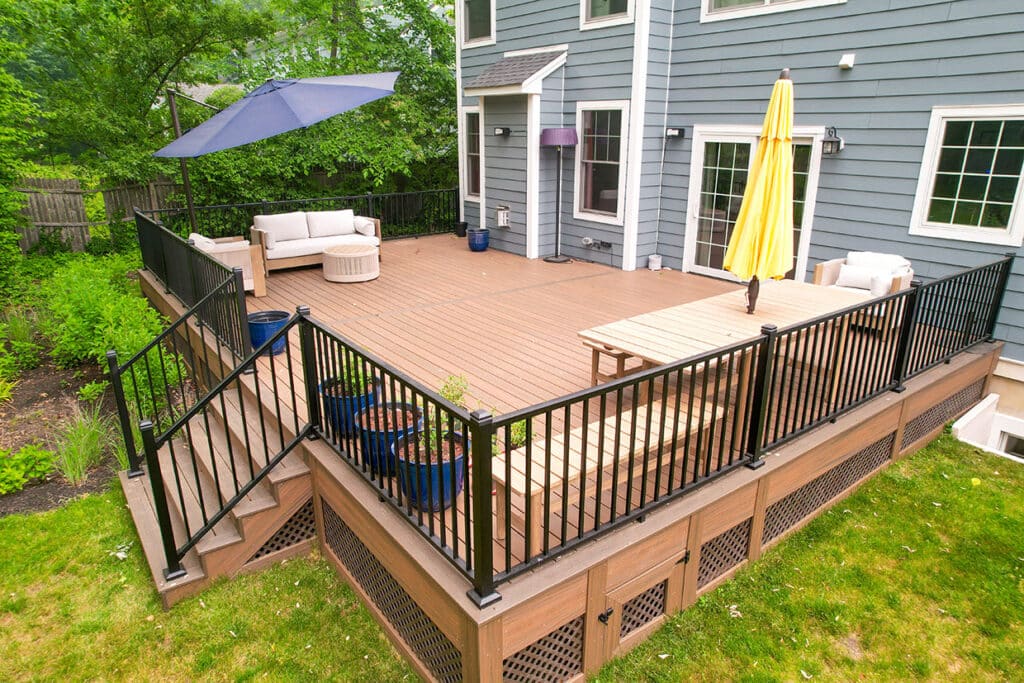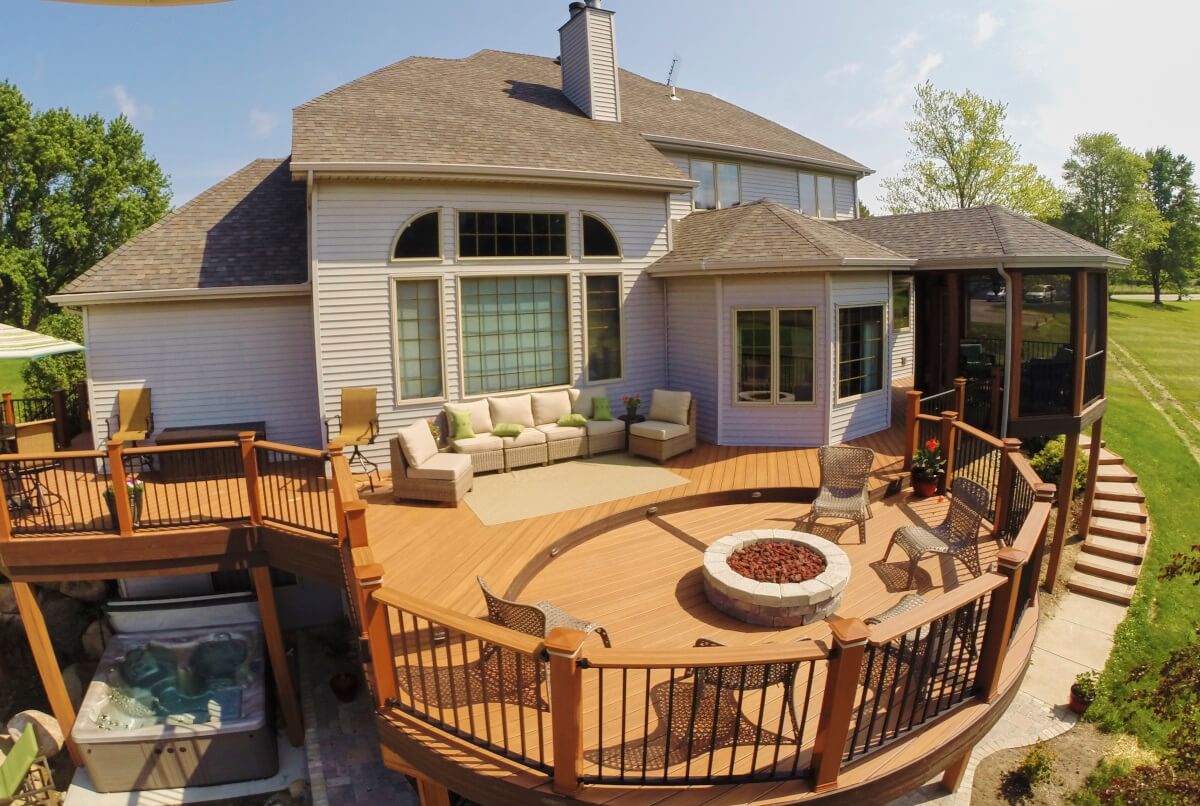A Step-by-Step Approach to Efficient Deck Installation for Property Owners
When it comes to installing a deck, cautious planning is key. Beginning by reviewing your room and establishing clear objectives. Understanding how to create your deck layout can make all the difference in maximizing your exterior area.
Assessing Your Area and Establishing Goals
Just how do you envision your excellent deck? Take dimensions to comprehend just how much area you've got to function with. Assume regarding how you desire to use the deck: will it be a relaxing retreat, an event spot for close friends, or a location for family members meals?
Next, set specific goals. Do you intend to integrate seats, a grill, or maybe planters? Envision the circulation of activity and verify it enhances your home's design. Focus on performance, but don't neglect visual appeals. Develop a listing of must-haves and nice-to-haves. This clearness will assist your choices and enhance the preparation procedure. By examining your space and setting clear objectives, you'll lay the structure for a deck that fulfills your requirements flawlessly.
Choosing the Right Materials
With your goals and area outlined, it's time to choose the right materials for your deck. If you live in a region with heavy rainfall or moisture, opt for materials immune to dampness, like composite outdoor decking or pressure-treated wood.
Next, consider your budget. Compound materials can be pricier upfront however frequently last longer and require much less upkeep. If you're on a tighter spending plan, treated lumber is affordable and extensively offered, however it might require routine upkeep.
Last but not least, don't forget appearances. Pick shades and textures that match your home and landscape. By very carefully choosing your products based upon these elements, you'll ensure your deck not just satisfies your needs yet also improves your outdoor room.
Designing Your Deck Design
Creating a well-thought-out deck layout is essential for maximizing both capability and pleasure. Beginning by considering just how you plan to make use of the space. Do you visualize organizing huge celebrations or looking for a comfortable place for leisure? This will lead your style.
Action your lawn to guarantee your deck fits harmoniously within the landscape. Think of circulation and access; it's necessary to develop pathways that make movement very easy. If you're adding furnishings, illustration a format that fits seating, tables, and any kind of additional attributes like planters or a fire pit.
Additionally, think about the sun and color patterns throughout the day. Positioning your deck to capture sunlight throughout cooler months can boost its use. Lastly, don't fail to remember regarding privacy-- including displays or landscaping can assist create a much more intimate setup. With careful preparation, your deck design will not just offer your demands but additionally raise your outdoor experience.
Acquiring Needed Permits
Prior to you begin developing your deck, it is essential to check regional policies and obtain the required permits. Each location has particular regulations controling deck building and construction, including dimension, elevation, and materials - custom deck builders company near me. Beginning by seeing your neighborhood building department or their site to gather information on what's needed
You'll likely need to fill in an authorization application and provide in-depth strategies for your deck, consisting of measurements and materials. Do not neglect to inspect if any zoning regulations or house owner organization standards relate to your building, as they may enforce additional restrictions.
When you send your application, the testimonial process can take time, so plan in advance. If your task doesn't meet regional codes, you might require to change your strategies, which can postpone your installation. By securing the required licenses initially, you assure that your deck task remains on track and abide by all laws.
Preparing the Ground and Structure
Preparing the ground and structure for your deck is important for making certain stability and durability. Next off, mark the outline of your deck using stakes and string to picture the area.
Once you've specified the location, dig down to eliminate the topsoil, reaching a depth of regarding 6 inches. This aids stop dampness accumulation and rot. If you're using concrete grounds, dig openings where your articles will certainly go, a minimum of 12 inches deep to reach secure dirt.
Take into consideration including gravel to the base of these openings for drainage. Condense the dirt to produce a solid base, and check for level with a long board or level device. By taking these actions, you'll set a solid foundation that supports your deck for years to come.
Building the Deck Structure

As soon as the framework remains in area, include joists, spaced equally for correct assistance. You can utilize joist hangers for a protected fit. Don't forget to double-check that everything is level and square as you go. This structure is essential for the resilience of your deck, so take your time and confirm each part is effectively set up. With your deck structure built, you're one action better to appreciating your brand-new outside oasis!
Including Ending Up Touches and Upkeep Tips
Since your deck is developed, it's time to concentrate on the finishing touches and upkeep. Selecting the right tarnish can improve its appearance, while regular cleaning maintains it looking fresh. Do not forget to comply with a seasonal maintenance list to guarantee have a peek at this website your deck remains in excellent shape year-round.
Selecting Deck Discoloration Options
How do you pick the best tarnish for your deck? Start by reviewing the type of timber. Different woods soak up stains differently, so inspect compatibility. Next off, consider the finish you desire. Transparent spots showcase the timber's natural appeal, while semi-transparent options include color without totally concealing the grain. Solid spots provide optimal protection, excellent for worn or aged timber.

Routine Cleansing Techniques

Seasonal Upkeep Checklist
A well-maintained deck can transform your outside space into a magnificent retreat, so it's vital to adhere to a seasonal upkeep checklist. Begin each springtime by inspecting for any kind of damages, such as loosened boards or rusting fasteners.
In summer, check for mold or mold and address it immediately. Maintain the deck devoid of clutter and look for indications of wear.
As autumn strategies, clear fallen leaves and particles to stop wetness accumulation. Tighten any kind of loosened screws.
Ultimately, throughout winter, verify that snow and ice are gotten rid of to prevent architectural damages. Normal interest to these tasks click to investigate keeps your deck looking terrific year-round!
Frequently Asked Questions
Just how Lengthy Does a Regular Deck Installment Take?
A typical deck installment can take anywhere from a couple of days to a number of weeks, depending upon dimension, products, and climate. You'll wish to plan as necessary to guarantee every little thing goes efficiently and efficiently.
Can I Mount a Deck on Irregular Ground?
Yes, you can install a deck on irregular ground. You'll need to level the location, usage adjustable blog post supports, or think about constructing a multi-level deck to fit the incline and guarantee stability.
What Devices Do I Required for Deck Setup?
You'll need a couple of essential tools for deck installation: a measuring tape, degree, saw, drill, hammer, and screws. Do not fail to remember safety gear like handwear covers and safety review glasses to maintain on your own shielded while working.
Just how Do I Ensure My Deck Is Safe and Sturdy?
To ensure your deck's safe and durable, consistently look for loose boards, protected barriers, and appropriate support. Use quality materials, follow building regulations, and take into consideration professional assessments to keep its honesty with time.
What Prevail Errors to Stay Clear Of Throughout Installment?
When installing a deck, stay clear of usual blunders like incorrect dimensions, neglecting permits, making use of low-quality products, or skipping the leveling process. These oversights can jeopardize security and sturdiness, so take note of detail throughout the job.